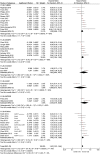A systematic review and meta-analysis of prognostic biomarkers in resectable esophageal adenocarcinomas
- PMID: 30185893
- PMCID: PMC6125467
- DOI: 10.1038/s41598-018-31548-6
A systematic review and meta-analysis of prognostic biomarkers in resectable esophageal adenocarcinomas
Abstract
Targeted therapy is lagging behind in esophageal adenocarcinoma (EAC). To guide the development of new treatment strategies, we provide an overview of the prognostic biomarkers in resectable EAC treated with curative intent. The Medline, Cochrane and EMBASE databases were systematically searched, focusing on overall survival (OS). The quality of the studies was assessed using a scoring system ranging from 0-7 points based on modified REMARK criteria. To evaluate all identified prognostic biomarkers, the hallmarks of cancer were adapted to fit all biomarkers based on their biological function in EAC, resulting in the features angiogenesis, cell adhesion and extra-cellular matrix remodeling, cell cycle, immune, invasion and metastasis, proliferation, and self-renewal. Pooled hazard ratios (HR) and 95% confidence intervals (CI) were derived by random effects meta-analyses performed on each hallmarks of cancer feature. Of the 3298 unique articles identified, 84 were included, with a mean quality of 5.9 points (range 3.5-7). The hallmarks of cancer feature 'immune' was most significantly associated with worse OS (HR 1.88, (95%CI 1.20-2.93)). Of the 82 unique prognostic biomarkers identified, meta-analyses showed prominent biomarkers, including COX-2, PAK-1, p14ARF, PD-L1, MET, LC3B, IGFBP7 and LGR5, associated to each hallmark of cancer.
Conflict of interest statement
Dr. Maarten F. Bijlsma has received research funding from Celgene. Dr. Martijn G. H. van Oijen has received unrestricted research grants from Bayer, Lilly, Merck Serono, and Roche. Prof. dr. Hanneke W. M. van Laarhoven has served as a consultant for Celgene, BMS, Lilly, and Nordic, and has received unrestricted research funding from Bayer, BMS, Celgene, Lilly, Merck Serono, MSD, Nordic, Philips and Roche. None of these parties was involved in drafting this review. All remaining authors have declared no conflicts of interest.
Figures



Similar articles
-
Clinicopathological and prognostic significance of epidermal growth factor receptor overexpression in patients with esophageal adenocarcinoma: a meta-analysis.Dis Esophagus. 2015 Nov-Dec;28(8):750-6. doi: 10.1111/dote.12248. Epub 2014 Jun 24. Dis Esophagus. 2015. PMID: 24961755
-
C-Met as a potential novel prognostic marker in squamous cell carcinoma and adenocarcinoma of esophagus: evidence from a meta-analysis.Panminerva Med. 2017 Mar;59(1):97-106. doi: 10.23736/S0031-0808.16.03228-6. Epub 2016 Sep 16. Panminerva Med. 2017. PMID: 27636117 Review.
-
PD-L1 Expression, Tumor-infiltrating Lymphocytes, and Clinical Outcome in Patients With Surgically Resected Esophageal Cancer.Ann Surg. 2019 Mar;269(3):471-478. doi: 10.1097/SLA.0000000000002616. Ann Surg. 2019. PMID: 29206673 Clinical Trial.
-
Prognostic Value of MicroRNAs in Esophageal Carcinoma: A Meta-Analysis.Clin Transl Gastroenterol. 2018 Nov 13;9(11):203. doi: 10.1038/s41424-018-0070-z. Clin Transl Gastroenterol. 2018. PMID: 30420592 Free PMC article.
-
Prognostic value of vascular endothelial growth factor expression in patients with esophageal cancer: a systematic review and meta-analysis.Cancer Epidemiol Biomarkers Prev. 2012 Jul;21(7):1126-34. doi: 10.1158/1055-9965.EPI-12-0020. Epub 2012 May 7. Cancer Epidemiol Biomarkers Prev. 2012. PMID: 22564870
Cited by
-
Tumor Markers and Their Prognostic Value in Sinonasal ITAC/Non-ITAC.Cancers (Basel). 2023 Jun 15;15(12):3201. doi: 10.3390/cancers15123201. Cancers (Basel). 2023. PMID: 37370810 Free PMC article. Review.
-
Molecular biomarker identification for esophageal adenocarcinoma using endoscopic brushing and magnified endoscopy.Esophagus. 2021 Apr;18(2):306-314. doi: 10.1007/s10388-020-00762-5. Epub 2020 Jul 29. Esophagus. 2021. PMID: 32728973
-
Crosstalk between Cancer Cells and Cancer-Associated Fibroblasts Mediated by TGF-β1-IGFBP7 Signaling Promotes the Progression of Infiltrative Gastric Cancer.Cancers (Basel). 2023 Aug 4;15(15):3965. doi: 10.3390/cancers15153965. Cancers (Basel). 2023. PMID: 37568781 Free PMC article.
-
Distribution of tumor-infiltrating-T-lymphocytes and possible tumor-escape mechanisms avoiding immune cell attack in locally advanced adenocarcinomas of the esophagus.Clin Transl Oncol. 2021 Aug;23(8):1601-1610. doi: 10.1007/s12094-021-02556-2. Epub 2021 Feb 10. Clin Transl Oncol. 2021. PMID: 33566304 Free PMC article.
-
The landscape of circulating tumor HPV DNA and TTMV-HPVDNA for surveillance of HPV-oropharyngeal carcinoma: systematic review and meta-analysis.J Exp Clin Cancer Res. 2024 Aug 3;43(1):215. doi: 10.1186/s13046-024-03137-1. J Exp Clin Cancer Res. 2024. PMID: 39095868 Free PMC article.
References
-
- Shapiro, J. et al. Neoadjuvant chemoradiotherapy plus surgery versus surgery alone for oesophageal or junctional cancer (CROSS): long-term results of a randomised controlled trial. The lancet oncology16, 1090–1098 (2015). - PubMed
-
- Bartley, A. N. et al. HER2 Testing and Clinical Decision Making in Gastroesophageal Adenocarcinoma: Guideline From the College of American Pathologists, American Society for Clinical Pathology, and the American Society of Clinical Oncology. Journal of Clinical Oncology, JCO. 2016.2069. 4836 (2016). - PubMed
Publication types
MeSH terms
Substances
Supplementary concepts
LinkOut - more resources
Full Text Sources
Other Literature Sources
Medical
Research Materials
Miscellaneous

